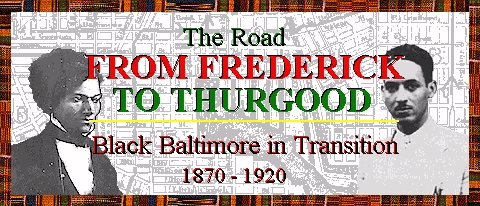 |
George M Lane:Political Activity |
 |
George M Lane:Political Activity |
George Lane's year in the political spotlight began with a flourish. In March of 1897 Lane presided over a mass meeting of colored Republicans at the Samaritan Temple. He voiced the sentiments of dissatisfaction that had been simmering for some time. "We are a part and parcel of the republican party, and we intend to share in the distribution of the offices. The time is come for us to get rid of the abominable republicans who are leading the party in this State." [1] Lane and his compatriots recognized a new breed of African Americans arising: educated men harboring aspirations to eminence and growing impatient with second-class status. "From this time onward, we shall tell those Republican leaders, if they don't realize it, that the world is moving, and that the colored race is moving straight along with it, and that today, were it not for difference of color and hair, thousands of Afro-Americans could not be distinguished in general make-up from the more favored and aggressive Anglo-Saxon." [2] Other notables who spoke at the meeting included W. Ashbie Hawkins and H.J. Brown. Lane and his compatriots floated the notion of running black candidates in the coming elections. [3]
Asbury Hall on Lexington Street was the scene for another meeting, held on April 2. ". . . we are republicans, and in accord with the principles enunciated in the State and national platforms, and at the same time place our solemn seal of condemnation upon the wholesale discrimination in the councils of the party." [4]
May 12 was the long-awaited date of the Committee convention. Despite sharing the same basic grievances against the party, those assembled held divergent views on how to address their problem. It was not clear how "independent" their movement was to be nor how "republican". Some at the meeting even spoke of joining the Democrats; "a riot nearly broke out" because of this suggestion. [5]
Black discontent was beginning to be noticed, and local Democrats wondered how to harness it to their advantage. In fact black Democrats were somewhat of a presence and were attracting new adherents. And some in the white Democratic establishment spoke of welcoming a colored contingent to their ranks. They were shouted down, however, by the less receptive members of the party. Nevertheless, rumors of Democratic backing of the black "mugwump" movement persisted.[6]
On August 21, George Lane announced his bid for the mayoralty "on a colored independent ticket" [7]
In September visions of representation were floating through the minds of Baltimore's black community. The Republican Party promised three black candidates for the legislature: Hawkins, Whitfield Winsey, and Walker W. Lewis. On the eve of the convention, these nominations were virtually a done deal. But in the face of a storm of protest from certain white Republicans, the party backed down and did not go through with their plans. At a meeting given by Republican ward leaders on September 13, reasons were given for these actions. The prominent colored citizens assembled did not accept them and instead vowed to hijack the Republican ticket. [8]
By October 6 the Committee had come up with a ticket. Lane was the candidate for mayor; J.U.V. Stith for Register of Wills; John Green for Sherriff; Dr. H.J. Brown, Charles J. Rush, and Benjamin F. Lester for court clerks. Things came crashing to a halt on October 21, though, when the Board of Election Supervisors ruled that more than half of the signatures submitted for nominating the ticket were invalid. With only one day provided to come up with the additional signatures necessary, the Committee was effectively shut out of the election. Lane did not contest the Board's decision but wanted it made known that he was not directly involved in obtaining the signatures and so was not culpable in the matter. Lester came forward shortly after the disqualification and alleged variously that the movement was dominated by Brown and Stith and that the Democrats were behind it all. [10]
Lane apparently dropped out of the public eye after the tumultuous year of 1897. There is evidence of marital and legal problems dating from 1905, and Lane lived out his last few years lodging temporarily at various Baltimore addresses. Lane died on June 26, 1912, succumbing to tuberculosis. [11] Lane's obituary in the Afro-American did not mention his political activities, which, though prominent, were presumably typical of the time. [12] But Lane, if perhaps quickly forgotten after the maelstrom of the 1890's, stands as the first African American to (almost?) run for mayor of Baltimore. It would be seventy years before a black candidate actually appeared on the ballot for a citywide office: Arthur Sherwood, who ran for mayor as a Republican in 1967.
 Professional
Career
Professional
Career
 Return
to George M. Lane Introduction
Return
to George M. Lane Introduction